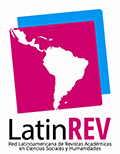International Insertion of Argentina Through the Development of Hydrogen as an Energy Carrier
Abstract
The international relations of the 21st century are marked by the efforts of the international community to limit the advance of global warming in order to avoid the irreversible and devastating consequences of climate change on human society. In this context, hydrogen has recently positioned itself at the center of the international scene as a strategic energy resource due to its enormous potential to decarbonize, among other sectors, the world energy matrix. This is not a minor fact in the field of the international relations, since energy, which has been consolidated as the sector with the highest emissions at global level, historically due to its strategic function for the development of society, has a central role in geopolitics and global relations. On the other hand, Argentina, which has an enormous potential to develop this sector, must also face great challenges to consolidate a long-term sustained strategic policy and to insert itself internationally in the clean energy value chain.
Downloads
References
Arango, M. J. y Lahoud, G. (2020). Seminario Recursos Naturales Estratégicos en América Latina, Geopolítica y Desarrollo. Documento de Cátedra.
Atchison, J. (2021). Ammonia infrastructure: panel wrap-up from the 2020 Ammonia Energy Conference. Ammonia Energy Association.
Banco de Desarrollo de América Latina. (2021). Caminos para la integración. Facilitación del comercio, infraestructura y cadena de valor globales. CAF.
Bárcena, A., Samaniego, J., Galindo, L. M., Ferrer Carbonell, J., Alatorre, J. E., Stockins, P., Reyes. O., Sánchez, L. y Mostacedo, J. (2018). La Economía del Cambio Climático en América Latina y el Caribe. CEPAL/Naciones Unidas.
Bloomberg New Energy Finance. (30 de marzo de 2020). Hydrogen Economy Outlook. https://data.bloomberglp.com/professional/sites/24/BNEF-Hydrogen-Economy-Outlook-Key-Messages-30-Mar-2020.pdf.
Bruckmann, M. (2011). Recursos naturales y la geopolítica de la integración. Investigación parte del proyecto Governança Global e Integração da América do Sul. Instituto de Pesquisa Económica Aplicada-IPEA de Brasil.
Chang, H. J. (2009). ¿Qué fue del buen samaritano? Naciones ricas, políticas pobres. Universidad Nacional de Quilmes.
Consorcio H2AR - YPF TECNOLOGÍA. (2021). Informe de Resultados 2021. https://y-tec.com.ar/consorcio-h2ar/.
Dehays Rocha, J. y Schuschny, A. (2019). Pobreza energética en América Latina y el Caribe. Organización Latinoamericana de Energía.
Del Valle Guerrero, A. L. (2016). La nueva geopolítica de la energía en la región sudamericana. Tendencias, actores y conflictos en la industria del gas. Universidad Nacional del Sur.
Fichtner Gmbh y Co. KG. (2022). Perspectivas de la demanda potencial de hidrógeno en Argentina.
Flores Romero, A. E. y Serrano Martínez, J. L. (2017). El surgimiento de la economía del hidrógeno, el uso de las energías renovables y su aportación a la economía verde. Administración y Organizaciones, 19(37), 73-92.
Furlán, A. (2017). La transición energética en la matriz eléctrica argentina (1950-2014). Cambio técnico y configuración espacial. Revista Universitaria de Geografía, 26(1) 97-133.
Gómez Montoya, J. F. (2016). La alternativa de Hedley Bull frente a las propuestas realistas y liberales como marco para el análisis de las relaciones internacionales en Latinoamérica. Papel Político, 225-248.
Hafner, M. y Tagliapietra, S. (2020). The Geopolitics of the Global Energy Transition. Springer Open.
Hydrogen Council. (2017). Hydrogen Scaling Up - A sustainable pathway for the global energy transition. Hydrogen Council.
Fundación Innova-T, CONICET, Instituto Petroquímico Argentino (IPA), Comisión Nacional de energía Atómica (CNEA), Instituto de Investigaciones Científicas y Técnicas para la Defensa (CITEDEF) y Mercados Energéticos Consultores (MEC) S.A. (2022). Perspectivas de la producción de Hidrógeno en Argentina, su potencial y costos.
International Energy Agency. (2019). The Future of Hydrogen. IEA.
International Energy Agency. (2021). Hydrogen in Latin America. IEA.
International Renewable Energy Agency. (2022). Geopolitics of the Energy Transformation: The Hydrogen Factor. International Renewable Energy Agency.
Koutoudjian, G. (2020). Geopolítica de la Energía. CACME.
Koutoudjian, I. J. (2021). Importancia geopolítica del cambio climático [Documento de trabajo de la Maestría de Relaciones Internacionales]. Universidad Austral.
Mateo, J. y Suster, M. (2021). Hacia la economía del hidrógeno: perspectivas de la agenda internacional y las oportunidades locales. Consejo para el Cambio Estructural, Ministerio de Desarrollo Productivo de la Nación.
Ministerio de Ambiente y Desarrollo Sostenible. (2020). Segunda Contribución Determinada a Nivel Nacional de la República Argentina.
Ministerio de Economía. (2021). Lineamientos para un Plan de Transición Energética al 2030. Secretaría de Energía.
Pflugmann, F. y De Blasio, N. (2020). The Geopolitics of Renewable Hydrogen in Low-Carbon Energy Markets. Geopolitics, History, and International Relations, 12(1), 9-44. https://doi.org/10.22381/GHIR12120201.
Ruiz, J. B. y Simonoff, A. (2017). La Escuela de la Autonomía, América Latina y la teoría de las relaciones internacionales. Estudios Internacionales, 49(186), 39-89.
Russell, R. y Tokatlian, J. G. (Diciembre de 2002). De la autonomía antagónica a la autonomía relacional: una mirada teórica desde el Cono Sur. Perfiles Latinoamericanos, 21, 159-194.
Scita, R., Raimondi, P. y Noussan, M. (2020). Green Hydrogen: the Holy Grail of Decarbonisation? An Analysis of the Technical and Geopolitical Implications of the Future Hydrogen Economy. Fondazione Eni Enrico Mattei. http://dx.doi.org/10.2139/ssrn.3709789.
Van de Graaf, T., Overland, I., Scholten, D. y Westphal, K. (2020). The new oil? The geopolitics and international governance of hydrogen. Energy Research & Social Science, 70. https://doi.org/10.1016/j.erss.2020.101667.
Zabaloy, M. F. y Guzowski, C. (2018). La política de transición energética de combustibles fósiles a energías renovables: el caso de Argentina, Brasil y Uruguay en el periodo 1970-2016. Economía Coyuntural, Revista de temas de coyuntura y perspectivas, 3, 1-34.
Copyright (c) 2023 David Tauss

This work is licensed under a Creative Commons Attribution-NonCommercial-NoDerivatives 4.0 International License.
This license allows the copy, distribution, exhibition and representation of the work provided authorship is acknowledged and the work is properly quoted. Commercial use of the original work or the generation of derived works are not allowed.
The authors hereby guarantee the right to the first publication of the work to the Revista Política Austral.




































